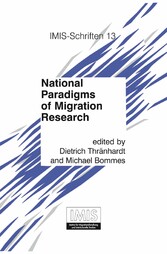
National Paradigms of Migration Research

von: Dietrich Thränhardt, Michael Bommes
Vandenhoeck & Ruprecht Unipress, 2010
ISBN: 9783862340934
Sprache: Englisch
325 Seiten, Download: 3079 KB
Format: PDF, auch als Online-Lesen
"How to Face Reality. Genres of Discourse within Durch Minorities Research (p. 81-82)
By Baukje Prins
Abstract
This chapter gives an overview of developments within Dutch minorities studies from the 1980s onward. Starting from a constructivist view of the performativity of language and the situatedness of all knowledge claims, four genres of discourse are discussed, each using its own rhetorical strategies to make readers ›face reality‹, and each appealing to one particular ethical-political value. The genre of denunciation calls for solidarity, the genre of empowerment promotes the value of diversity, while the report is dedicated to the emancipation of minority groups. In the 1990s, due to emerging critical voices in the public debate and the backlash against (Muslim) immigrants since the ›September 11‹ attacks on the US and the murder of Pim Fortuyn in 2002, these three genres gradually lost credibility because of their presumed ›political correctness‹. This led to the dominance of a fourth genre of discourse, that of new realism, which appeals to the value of individual responsibility. Although the four genres seem to be incompatible, this appears to be the case neither in theory nor in practice. Across what look like unsurpassable boundaries, the Dutch discourse has also produced unexpected alliances between these different genres. The chapter concludes with some selfreflexive remarks on the values and political perspective underlying this analysis itself, ending with a plea for exploring an alternative genre, that of heterogeneity, as most suitable to the ethical-political value of a liberal democracy: a responsiveness to otherness and a commitment to justice and fairness for all.
Introduction
Since the early 1980s, the Netherlands have pursued an active policy to further the integration of ethnic minority groups in Dutch society. Subsequent governments put scientific experts to work to investigate the history, socio-economic position and cultural background of different minority groups – investments which testified to a strong belief in social engineering and the ›makeability‹ of Dutch society. In this paper, I will discern four significant genres of discourse within Dutch minorities studies that use different rhetorical strategies to make their readers ›face reality‹.1 Among these are the genre of denunciation and the genre of empowerment.
But the dominant genre within Dutch minorities research has been the genre of the report. Until the early 1990s, most reports represented migrants as members of a particular minority group, i.e. as individuals who are socially and/or economically deprived because of their traditional culture. Emancipation was assumed to be the only way out, and Dutch government could help minorities achieve that aim. A decade ago, however, a new kind of report has come to the fore, in which cultures of minority groups are not so much perceived from the perspective of deprivation, but from the perspective of deviancy.
I will argue that this trend in Dutch minorities research shows a remarkable affinity with a fourth genre of discourse, that of new realism. Since the 1980s, against the assumed ›political correctness‹ of the genres of denunciation, empowerment and report, new realism has become ever more dominant in Dutch public and political debates on immigration and ethnic minorities."







